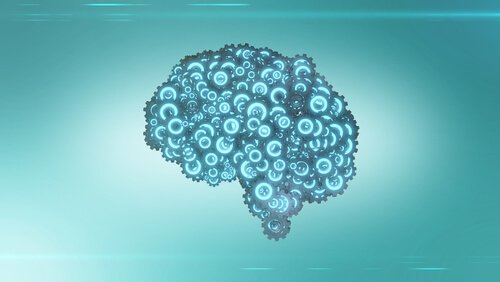What Type of Exercise Is Best for the Brain?

Exercise is not only extremely positive for the health of our hearts, it is also good for the brain. It is not just a way to keep us in good physical shape or improve our mood. It is also a completely natural way to improve our memory and protect our brain against the cognitive decline associated with the passing of the years.
However, not all types of exercise are equally beneficial to the brain. In this article, we will see exactly what type of exercise is better for the brain, according to the results of the latest scientific studies.
A lot of recent research suggests that any type of exercise that raises the heart rate and makes us move and sweat for a prolonged period of time (ie, aerobic exercise) has a significant and very beneficial impact on the brain.
In general, exercise changes the structure and functioning of the brain. Studies in animals and humans have shown that physical activity generally increases brain volume. It can reduce the number and size of age-related problems in the white and gray matter of the brain. In addition, exercise increases adult neurogenesis, the creation of new neurons in an already mature brain.

Aerobic exercise, key to a healthy brain
We can already enjoy some benefits of exercise within a few minutes of starting to do it. Other benefits, such as memory improvement, may take several weeks to appear. That implies that the best type of physical conditioning for the brain is any type of aerobic exercise that can be performed regularly and consistently for at least 45 minutes.
A study in people with severe depression found that only 30 minutes of walking on a treadmill for 10 consecutive days was sufficient to produce a clinically relevant and statistically significant reduction in depressive symptoms.
Aerobic workouts can also help people who don’t suffer from clinical depression to feel less stressed. What happens is that levels of the body’s natural stress hormones, such as adrenaline and cortisol, decline. This is all according to a recent study in the Journal of Physical Therapy Science.
On the other hand, a study published in the British Journal suggests that the best results for people over 50 come from a combination of aerobic and resistance exercises. These combinations can range from high intensity interval training to dynamic yoga flows. These are interspersed with strength training (with weights or using body weight) or dance movements.
Another study supports that research. This study found that, in adults aged 60 to 88, walking for 30 minutes, four days a week, for 12 weeks, seemed to improve synaptic activity in areas of the brain related to memory and sensitive to deterioration with the passage of years.
After exercising, we think better
Researchers are still not sure why exercise, specifically aerobic exercise, seems to improve brain function. The fact is that studies suggest that it has to do with the increase in blood flow. This in turn provides the brain with energy and oxygen. But it is not the only explanation.
In fact, we can all experience (and many of us have already) the effects that going for a walk or doing a little exercise have on our mind. A walk, or any other form of exercise, makes us feel more lucid.

This feeling is not just our imagination. Research suggests that we think and learn better when we walk or do another form of exercise. Research shows that when we exercise, blood pressure and blood flow increase throughout the body, including the brain. That will lead to more energy and oxygen, which, in turn, makes our brain work better.
Another explanation for why exercising increases our mental capacity is to do with the hippocampus. This part of the brain is essential for learning and memory, and is very active during exercise. When the neurons in this area accelerate, our cognitive function improves.
In this regard, a study of older women who showed potential symptoms of dementia found that aerobic exercise produced an increase in hippocampal size. According to the researchers, this study suggests that anyone over 50 and in good general health, should do 45 minutes of aerobic exercise 4-5 days a week, whenever possible.
Exercise is not only extremely positive for the health of our hearts, it is also good for the brain. It is not just a way to keep us in good physical shape or improve our mood. It is also a completely natural way to improve our memory and protect our brain against the cognitive decline associated with the passing of the years.
However, not all types of exercise are equally beneficial to the brain. In this article, we will see exactly what type of exercise is better for the brain, according to the results of the latest scientific studies.
A lot of recent research suggests that any type of exercise that raises the heart rate and makes us move and sweat for a prolonged period of time (ie, aerobic exercise) has a significant and very beneficial impact on the brain.
In general, exercise changes the structure and functioning of the brain. Studies in animals and humans have shown that physical activity generally increases brain volume. It can reduce the number and size of age-related problems in the white and gray matter of the brain. In addition, exercise increases adult neurogenesis, the creation of new neurons in an already mature brain.

Aerobic exercise, key to a healthy brain
We can already enjoy some benefits of exercise within a few minutes of starting to do it. Other benefits, such as memory improvement, may take several weeks to appear. That implies that the best type of physical conditioning for the brain is any type of aerobic exercise that can be performed regularly and consistently for at least 45 minutes.
A study in people with severe depression found that only 30 minutes of walking on a treadmill for 10 consecutive days was sufficient to produce a clinically relevant and statistically significant reduction in depressive symptoms.
Aerobic workouts can also help people who don’t suffer from clinical depression to feel less stressed. What happens is that levels of the body’s natural stress hormones, such as adrenaline and cortisol, decline. This is all according to a recent study in the Journal of Physical Therapy Science.
On the other hand, a study published in the British Journal suggests that the best results for people over 50 come from a combination of aerobic and resistance exercises. These combinations can range from high intensity interval training to dynamic yoga flows. These are interspersed with strength training (with weights or using body weight) or dance movements.
Another study supports that research. This study found that, in adults aged 60 to 88, walking for 30 minutes, four days a week, for 12 weeks, seemed to improve synaptic activity in areas of the brain related to memory and sensitive to deterioration with the passage of years.
After exercising, we think better
Researchers are still not sure why exercise, specifically aerobic exercise, seems to improve brain function. The fact is that studies suggest that it has to do with the increase in blood flow. This in turn provides the brain with energy and oxygen. But it is not the only explanation.
In fact, we can all experience (and many of us have already) the effects that going for a walk or doing a little exercise have on our mind. A walk, or any other form of exercise, makes us feel more lucid.

This feeling is not just our imagination. Research suggests that we think and learn better when we walk or do another form of exercise. Research shows that when we exercise, blood pressure and blood flow increase throughout the body, including the brain. That will lead to more energy and oxygen, which, in turn, makes our brain work better.
Another explanation for why exercising increases our mental capacity is to do with the hippocampus. This part of the brain is essential for learning and memory, and is very active during exercise. When the neurons in this area accelerate, our cognitive function improves.
In this regard, a study of older women who showed potential symptoms of dementia found that aerobic exercise produced an increase in hippocampal size. According to the researchers, this study suggests that anyone over 50 and in good general health, should do 45 minutes of aerobic exercise 4-5 days a week, whenever possible.
This text is provided for informational purposes only and does not replace consultation with a professional. If in doubt, consult your specialist.







